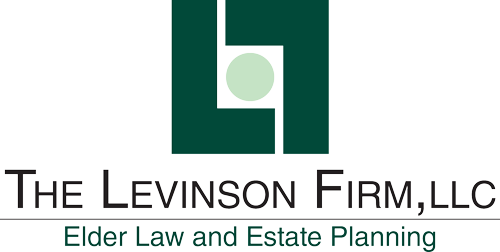Volume 7 Issue 2
Summer 2017

Karla B. Levinson, Esq.
Tanya S. Sellers, Esq.
Contact Us:
Address:
1326 King Street
Wilmington, DE 19801
Phone:
(302) 656-3393
Fax:
(302) 656-1993
Website:
www.levinsonfirm.com
Writing a Fitting Tribute
Have you ever considered writing a tribute to a loved family member or dear friend, but do not know where to start? Many people do not even consider writing a tribute until that loved one has passed away. It expresses a special and meaningful endearment to write a tribute to someone and to have the opportunity to share it with them; enjoying it together.
But where do I start? It is best to start by writing in the style that is most comfortable for you. If you are a list maker then write a list of all the qualities of your loved one you most admire, or a list of your favorite times spent together. Some prefer writing a poem or a song about their feelings shared; that is a fun way to start. Another old-fashioned writing style is an outline. Personally, I love an outline because it encourages me to think of the bullet points I want to focus on and then expand on those thoughts as I dig deeper into the story.
If you plan to only share the tribute with your loved one verbally, then you can simply use your notes to share your admiration. However, if you want to share your tribute and then perhaps present it in written form, it might be nice to print the gift out on specialized paper and frame it.
Keep it simple, share from your heart. Try to share stories about special memories that you have made together – both humorous or emotional. Talk about what happened and how that impacts you – your thoughts and feelings. Share the lasting impression that those times left on you and how you remember your loved one in that moment. It is much easier to express your feelings by using stories. Set your pen to paper and let the memories take you where they will. Share from your heart.
Whichever presentation that you decide will surely make a lasting impression on your family. We are all busy, but taking the time to invest in your family legacy, will provide lasting memories that carry with them blessings and a rewarding experience.
Thank you to Sharon Gilgenast, Advanced Planning Consultant, at Strano & Feeley Family Funeral Home for this article. If you have questions about pre-planning a funeral, please contact Sharon at 302-525-2730 or sharon@stranofeeley.com.
Volume 7 Issue 2
Page 2
Dates of Wartime Service
If you are a Veteran or Surviving Spouse of a Veteran that served during these time periods, you may be entitled to VA benefits. Call us at 302- 656-3393 for more info.
WWI: Apr. 6, 1917 to Nov. 11, 1918 or Apr. 1, 1920 if served in Russia
WWII: Dec. 7, 1941 to Dec. 31, 1946
Korean War: June 27, 1950 to Jan. 31, 1955
Vietnam War: Aug. 5, 1964 to May 7, 1975 or Feb. 28, 1961 to Aug. 4, 1964 if served in Vietnam
Persian Gulf War: Aug. 2, 1990 to TBD
Reasons to Create a Last Will & Testament
Individuals work a lifetime at accumulating savings, personal property and mementos. It only takes a little time to make sure those valued items pass on to your loved ones. If executed correctly, a Last Will and Testament can clearly state your wishes and ensure they are carried out.
Other reasons to take the time to prepare a will include:
1. You care about your family and loved ones so you do not want to leave them to figure everything out on their own after your death. By planning, you are conveying the message they are important enough for you to have taken the time to state what your wishes are with respect to your property and assets.
2. People may not die in the order you plan so if a joint account owner passes away before you do, you have a contingency plan in place. Your loved ones will know what your wishes are if the co-owners on your accounts die before you do.
3. You want to include plans for a bequest or gift to a charitable, religious, social or community organization that has played a significant role in your life or the life of a loved one. It is important to take the time to include them in your planning.
4. You do not want the State to determine how your assets and property are divided and distributed. The State will divide your property between your spouse and children or other relatives. You would rather make that decision yourself, rather than having the State decide who inherits your property by certain inflexible and impersonal state laws, some of which may violate your personal wishes.
5. You do not want your family to fight over important personal items. It is easier to make a decision and communicate your wishes to your loved ones.
6. You do not want a court to determine who is to be your executor and take care of your affairs after your death. Making a decision on who you want to handle your affairs after your death is not difficult and will make the situation so much easier on your family and loved ones.
7. A will can be changed. So, if circumstances change you have the ability to make whatever changes you deem appropriate. The changes can be due to personal circumstances, death of children, family members or named executors, changes in your financial situation, tax laws and charitable preferences.
8. You do not want your estate to pay estate taxes. Through proper planning, federal and state estate taxes can be minimized or avoided altogether.
Of course, a Last Will and Testament may not be appropriate in your situation. A Revocable Living Trust, for example, may be necessary for tax planning purposes. You may also wish to explore long-term care asset protection planning options. Whatever your situation, seeking the advice of an elder law attorney who can assist you in pre-planning will ensure your wishes will be followed upon your death. They can also help minimize, or even eliminate, any estate taxes. If you would like more information on creating a will, please contact us at 302-656-3393.
This newsletter is intended for informational purposes only and does not constitute legal advice. For legal advice, consult a licensed attorney. The examples used are simplified for ease of understanding and illustration of general concepts.
Volume 7 Issue 2
Page 3
Protect Yourself From Scammers!
Unfortunately, seniors are often the target of scammers. As the weather gets warmer, more door-to-door salesmen start to appear and can leave older adults vulnerable to scams. It seems that we have all heard of seniors getting a knock on the door by a “handyman” to tell them they need a new roof or their driveway needs to be replaced immediately. Often times he will quote a low fee, collect it, then disappear with the money or do a sub-par job, never to be seen again. Use the following tips, adapted from The National Council on Aging, to avoid scammers:
- Tell solicitors, “I never buy from (or give to) anyone who calls or visits me unannounced. Send me something in writing.” A reputable company will be happy to honor your request.
- Carefully read all contracts and purchasing agreements before signing and make certain that your requirements have been put in writing.
- Be sure you understand the details of any contract you sign – including cancellation and refund policies.
- Pay with a check or money order to have a record of payment. Never pay in cash, as there is no paper trail.
- Only work with established businesses and ask for references of their work. It’s also a good idea to call the Better Business Bureau to check on past jobs and customer experience. Call the Delaware office at 302-221-5255.
- Never allow yourself to be pressured into making a purchase or donation.
- If an offer sounds too good to be true, it probably is.
- When in doubt, seek the advice of a trusted friend, family member, or pro-fessional.
If you suspect that you, or a loved one, have been scammed, contact the Consumer Protection Unit at the Attorney General’s Office at 302-577-8600.
Tanya Sellers Elected Section Secretary
Tanya Sellers was recently elected Secretary of the Delaware State Bar Association Elder Law Section. The Elder Law section is comprised of Delaware attorneys who are interested in the impact of the law on the elderly, including but not limited to, issues relating to elder abuse and financial exploitation, adult guardianships, durable powers of attorney, advance health-care directives, long-term care and health insurance, government assistance programs, the use of trusts for special needs and long-term care planning. Congratulations, Tanya!
Volume 7 Issue 2
Page 4

This newsletter is intended for informational purposes only and does not constitute legal advice. For legal advice, consult a licensed attorney. The examples used are simplified for ease of understanding and illustration of general concepts.
Like Us On Facebook
The Highest Compliment Is Your Trust!
We would like to thank YOU for continuing to refer our firm to others. It is because of you that we can assist so many with their elder law needs.
A warm thank you to:
Joe Bakey – Right at Home
Stacey Battles – Millcroft
Joseph Bosik, Esq. – Gordon Fournaris & Mammarella
George Brancati, Esq.
Colleen Brilhart – Brandywine Nursing & Rehabilitation
Robert Campbell – Raymond James Financial Services, Inc.
Chris Collins – Kentmere
John Conly, Esq.
Mark Dalle Pazze, Esq. – Herdeg, duPont & Dalle Pazze, LLP
Cyndy Fanning – Swank Memory Center
Sally Goodman – Kutz Home
Deidrea Haysel – A Place for Mom
Carolina Heinle, Esq. – Crossland, Heinle & Bryde, LLC
Mylea Jackson – Arden Courts
Peter Kirsh, Esq. – The Kirsh Law Firm
Michael Odorisio, CFP, First VP – Morgan Stanley
Carol Lee Page – Parkview
David Parkinson – The Lorelton
Jeannine Patone – The Onix Group
Susan Ricciardi – Regal Heights
Kathy Scott – Shipley Manor
Thomas Shellenberger, Esq. – Law Offices of Thomas Shellenberger
Quinna Staten – The Summit
Raymond Tomasetti, Esq. – Tomasetti Law, LLC
Michael Trolio – Gunnip & Company LLP
T.J. Zak – Wells Fargo





